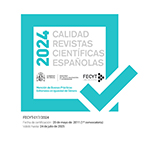Lecciones éticas y ciudadanas de los Pueblos Mayas para el mundo. Filosofía política y metodologías de un proyecto educador
Resumen
This article describes some of the results of the project entitled “Intercultural conflict, education and active democracy in Mexico: Citizenship and indigenous rights in the bilingual and intercultural pedagogical movement of the Los Altos, Northern and Lacandon Rainforest Regions of Chiapas”. The first part describes the context in which this project was developed, the political philosophy that inspired it, as well as the methodology used, with particular emphasis on: (1) domination-subordination in intercultural relations; (2) the implicit expressions of a praxis of active resistance in the practical lives of indigenous societies, and (3) the various approaches applied, viz. inductive (Gasché, forthcoming a & b), qualitative (Glasser and Strauss, 1967), ethnographic (Bertely, 2000a), and evocative (Podestá, 2002 y 2003; Lindenberg, 1996). The second part of the article systematizes the results of the experimental stage and that devoted to the design of the educational material within a project founded on a mutual learning process and collaboration between indigenous teachers and non-indigenous specialists.Descargas
Descarga artículo
Licencia
La Revista de Antropología Social, para fomentar el intercambio global del conocimiento, facilita el acceso sin restricciones a sus contenidos desde el momento de su publicación en la presente edición electrónica, y por eso es una revista de acceso abierto. Los originales publicados en esta revista son propiedad de la Universidad Complutense de Madrid y es obligatorio citar su procedencia en cualquier reproducción total o parcial. Todos los contenidos se distribuyen bajo una licencia de uso y distribución Creative Commons Reconocimiento 4.0 (CC BY 4.0). Esta circunstancia ha de hacerse constar expresamente de esta forma cuando sea necesario. Puede consultar la versión informativa y el texto legal de la licencia.












